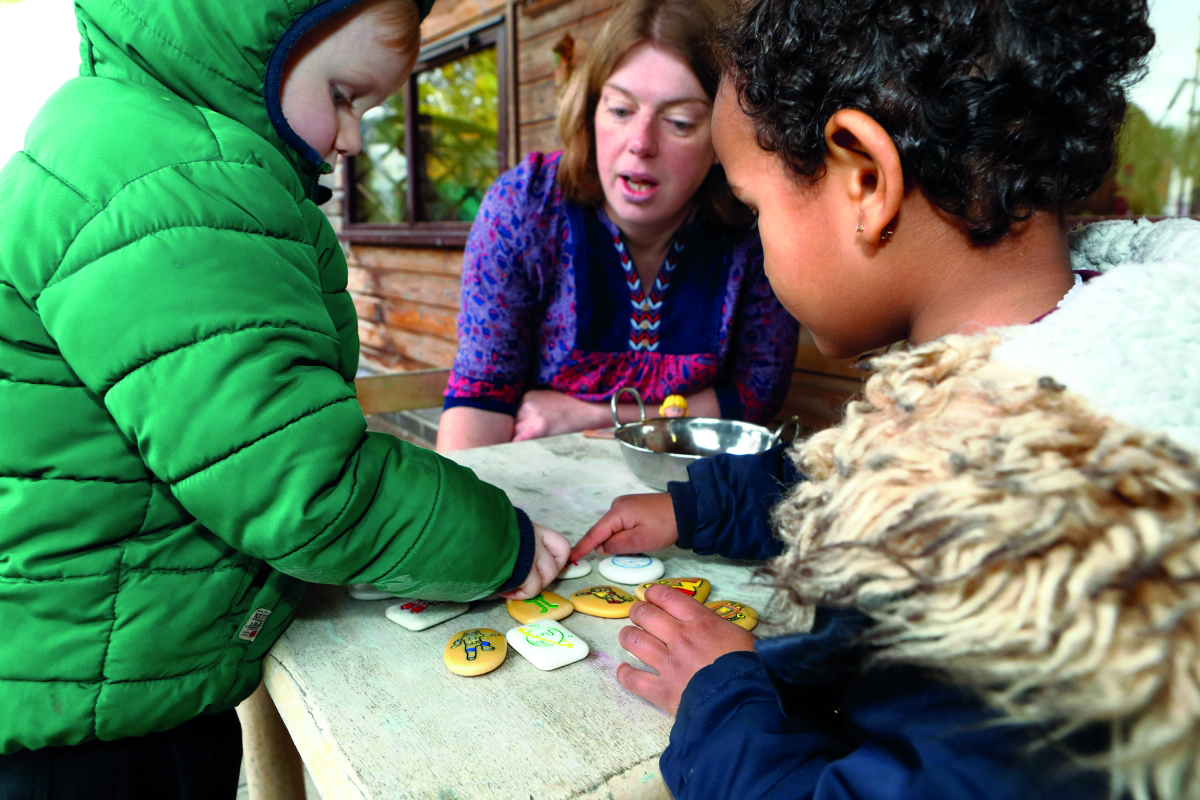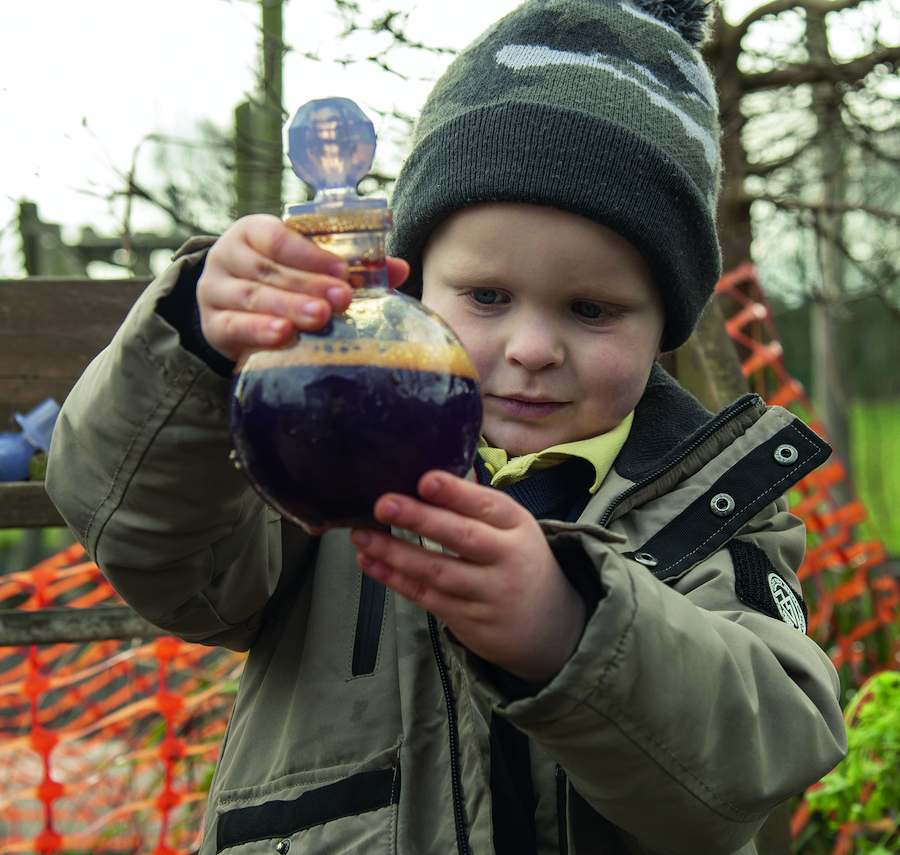
Children develop words and phrases and build language through their interactions with others. Once babies begin to understand words, at around six months, their vocabulary increases at a rapid pace. During this window of opportunity, the quality of conversations children have with adults and other children throughout the day is crucial. Reading aloud, sharing books, singing, rhymes and pretend play are all playful ways to extend language, which in turn builds on the foundations for literacy. As Carole Mills, chief executive of Yellow Door, says, imaginative play is the ‘cornerstone’ of narrative language. ‘Children will not be able to write stories if they haven’t had the opportunity to tell stories as they play. If they are offered interesting play environments, they will naturally tell stories rich with descriptive language.’
Open-ended small-world play resources are perfect for inviting imaginative play and promoting story language. But ‘don’t be tempted’ to create a perfect play set, Mills says, because this ‘may restrict children's imaginations. Resources that can be used in different ways require more imaginative thinking, which leaves children free to follow their own interests. In doing so, they will be more emotionally engaged and more creativity and language will follow.’
Combining resources in interesting ways – for example, incorporating fabrics with different textures – helps promote sensory engagement and offers opportunities to talk to children about what things feel like. ‘The more variety of materials and textures you can offer children, the greater will be the possibilities for descriptive language,’ Mills explains.
COMMUNICATION-FRIENDLY PLAY SPACES
 Pretend play and acting out scenarios that are familiar to children can deepen children's learning and extend their language development.
Pretend play and acting out scenarios that are familiar to children can deepen children's learning and extend their language development.
Charlotte Haley, manager at Noak Bridge Pre-School in Essex, introduced large dolls in her setting to help a child with language delay.
She says, ‘Large dolls are good to have in practice because some children find them easier to relate to real-life experiences. They tend to interact with them more, helping to dress and feed them, like they would with a sibling. One four-year-old I work with has had to learn how to process, pronounce and link new words after glue ear affected her hearing. After the operation for grommets, her speech continues to progress, helped by practitioners repeating words back to her and extending vocabulary. The large dolls – we use Persona Dolls – have helped enormously, as she's able to feed and dress the dolls, saying words like “strawberry”, “cake”, “trousers”, “shoes”, “right” and “left” when putting arms and legs through the clothes.’
INTERACTIVE STORYTELLING
 Encouraging children to engage with pictures and texts and ask questions during storytime is a great way to support communication and language and can boost early language development by up to seven months, according to new evidence from the Education Endowment Foundation (EEF). Examples of effective reading strategies include encouraging young children to think about what happens next in a story, modelling language and relating stories to their own experiences. Vocabulary strategies given by the EEF include explicitly labelling the different parts of an object – such as a flower – and encouraging children to repeat the words.
Encouraging children to engage with pictures and texts and ask questions during storytime is a great way to support communication and language and can boost early language development by up to seven months, according to new evidence from the Education Endowment Foundation (EEF). Examples of effective reading strategies include encouraging young children to think about what happens next in a story, modelling language and relating stories to their own experiences. Vocabulary strategies given by the EEF include explicitly labelling the different parts of an object – such as a flower – and encouraging children to repeat the words.
By sensitively engaging with children and commenting on or describing what they are doing, practitioners can also support children to link words and ideas in their play. For example, in the construction area, use phrases such as, “Your bridge is getting longer and longer.”
It is also important to give young children plenty of processing time – at least ten seconds – to understand what you have said and think before they reply.
Mispronouncing words, such as ‘tat’ instead of ‘cat’, is common in early childhood. Instead of correcting them, reply to what they say and model the words they have mispronounced back to them. For example, saying, ‘Oh yes, it's a cuddly cat.’
RESOURCES
- Cosy: Take books aboard the Book Barge, £795, or take role play to a new level outdoors with Tilbury Castle, £385, where children can act out being royalty. Panorama Point, £995, is a great space for enacting stories, or cosy up with a good story in Ye Olde Story Throne Large, £149.99. For outdoor small-world play, try the Enchanted Dwelling, £129.99, or for dramatic play and storytelling opportunities, see the Story Spooncrate Centre, £215.
- TTS: Enrich language opportunities with the Messy Play WOW Pack, £119.92, where children can make magical potions and learn new words along the way. Sing It Bag Song and Rhyme Activity Set, £44.99, contains wooden tiles with well-known songs or rhymes, or for older children, try Alice Sharp's Language Enrichment Bags, from £219.99. Dive into the treasure trove of the Metallic Collection Basket, £164.99, or marvel at the Early Years Immersive Projector, £199.99.
- Early Excellence: Engage children in reading with the Favourite Stories Collection 2-3yrs, £74.95, or Contemporary Tales, 3-6yrs, £77.95, which both include puppets and soft toys. Or encourage imaginative play with the Handa's Surprise Book and Character Set, £36.95. Complete your home corner with the Role Play Baby Set, £115, the Cleaning Resource Collection, £59.95, and the wooden Ironing Board and Iron, £95.
- Yellow Door: Scenery Stones, £20 per set, are engraved stones with pictures of polar, woodlands, ocean and fairy tales that have been designed to inspire language and storytelling. Let's Roll Nursery Rhymes, £15, are playdough rollers with nursery rhyme images imprinted on them. Fantasy Figures, £20, and Enchanted World objects, £20, both part of the Little Hands range, have been designed to encourage language development through imaginative small-world play. Or try the Let's Boost… Language through Stories Kit, £200, to help get young children talking and telling stories to boost their language development.
- Encourage children to get talking with TickiT Talking Tubes Telephone Exchange, £69.99, which allows children to pass a message to each other across networks and distances, or add props into the home corner like the Plastic Toy Telephone, £17.95, from Youth Purchasing Organisation. Persona Dolls come in all different races and cultures; the African/ African Caribbean Girl, £76.50, from Persona Doll Training, comes with a range of outfits that can be bought separately.
CASE STUDY: Noak Bridge Pre-School
The home corner is the central hub of Noak Bridge Pre-School in Essex. Since the staff moved the kitchen and lounge area into the middle of the open-plan room, more children have gravitated to the space, keen to get involved in cooking, washing clothes and looking after babies. As a result, opportunities to explore language have increased, with even the quietest children who prefer solitary play entering into the area to familiarise themselves with the rich, exciting play as they slowly absorb the language.
Manager Charlotte Haley says, ‘From the youngest children, to those with speech and language delay, English as an additional language and special educational needs, all children want to be in this space at certain times throughout the day.
‘It's been so successful that we’ve expanded the area and added a sofa with soft furnishings, along with offshoot “rooms” with dressing-up clothes and a mirror. In the kitchen, the units are at different levels so that all children can get involved. The younger ones love to open the cupboard doors and empty items in and out and the older children get involved in role play, setting the table or feeding the baby in the high chair.
‘Having a sofa is a great addition to a home corner. When the three- and four-year-olds are playing co-operatively, one might sit on the sofa, while another is at the table or cooking in the kitchen. We’ve noticed some of the quieter children like to sit and observe the children in their role play, dipping in and out of the play.
‘We have some wooden food but we also like to use real food because we believe real-life experiences enrich language development. We often put out lemons, limes and oranges, and children can use the squeezer to make juice. This gives us the opportunity to discuss colours, textures and smells and extend the vocabulary, using words like “bitter”, “sour”, “zest” when grating the fruit for cooking activities, or “rough” and “smooth”.
‘We have lots of cookbooks from different cultures and have Chinese play food sets, Mexican sets and Italian food. Because we use in-the-moment planning, we are constantly trying to extend play, curiosity and vocabulary; food is a great way to do this. If they are engaged and their curiosity is high, they are more likely to use their language.’









